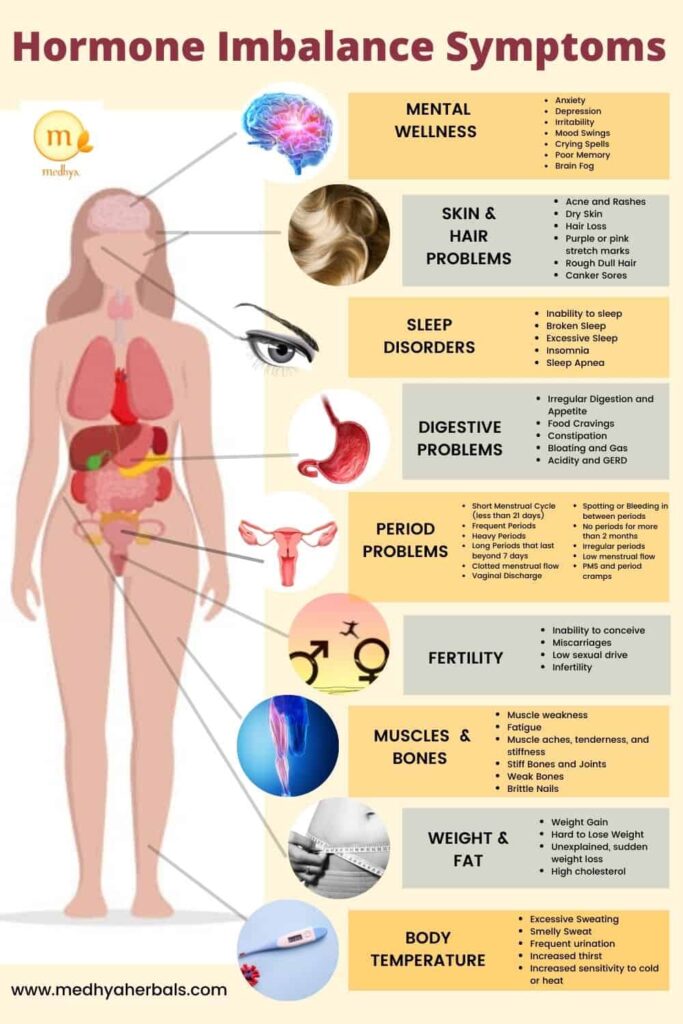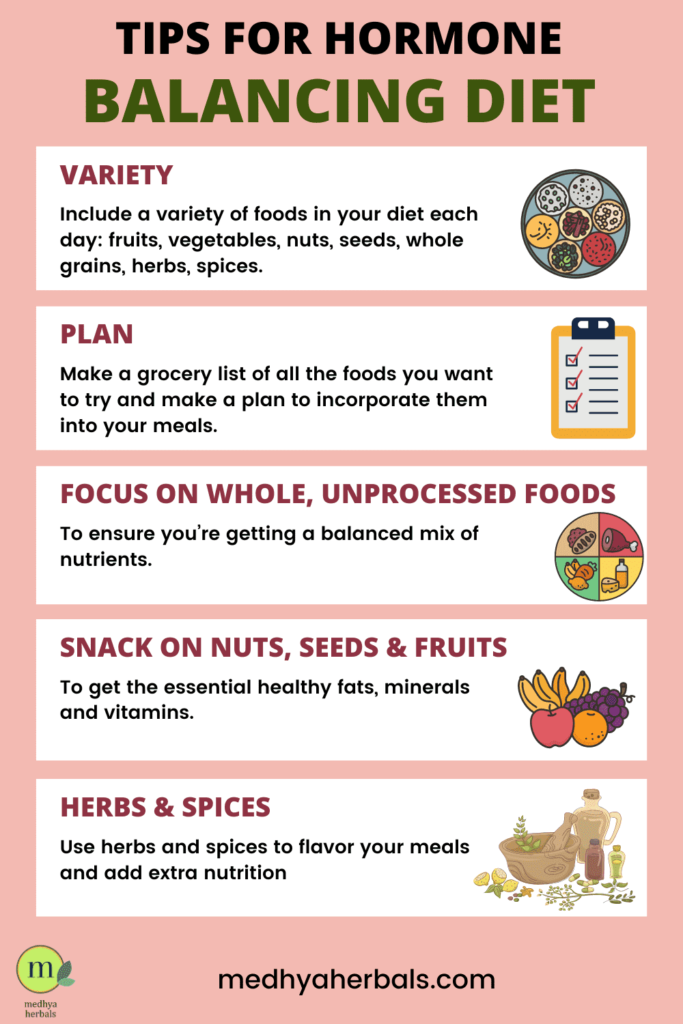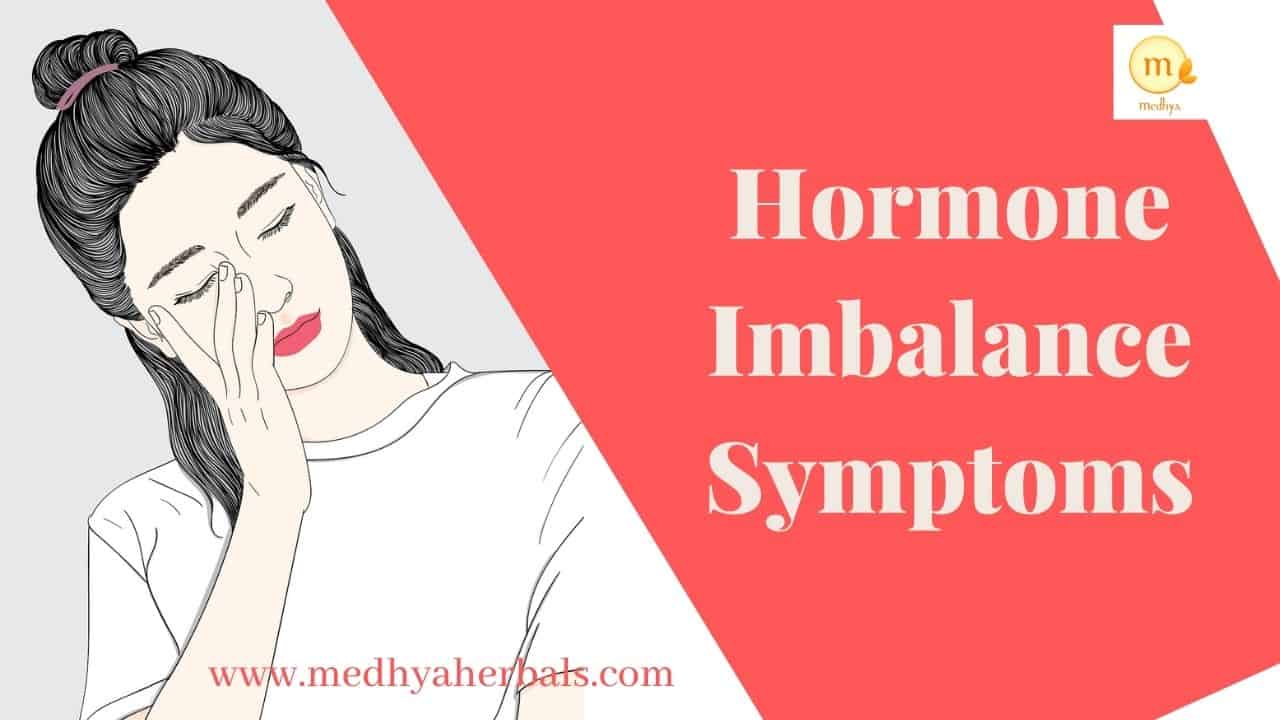Every woman’s body tells a story, but sometimes the signs are puzzling. When unexpected mood shifts, unexplained weight changes, or sleepless nights become a pattern, they could be signaling something deeper. These are often the silent whispers of hormonal imbalance symptoms in females. While many brush them off as ‘just one of those days’, recognizing these signs of hormone imbalance is pivotal to overall well-being.
With years of research and firsthand experience in hormonal imbalance treatment, we’ve delved deep into these symptoms, their causes, and the paths to wellness. If you’ve ever found yourself wondering about those unexpected mood swings, sudden fatigue, or shifts in weight, you’re not alone, and more importantly, you’re in the right place. Journey with us as we unravel the intricacies of hormonal health, ensuring you’re equipped with the knowledge to navigate your unique experience.
Understanding Hormonal Imbalance in Females
Hormonal imbalance refers to a situation where there’s an overproduction or underproduction of specific hormones in the body. In females, this commonly involves hormones such as estrogen, progesterone, and testosterone. These imbalances can be temporary or chronic and can be caused by a variety of factors including age, stress, lifestyle, and medical conditions.
One of the challenges with hormonal imbalances is that the symptoms can often mimic other health issues. Common signs include:
- Irregular periods or skipped menstrual cycles
- Persistent fatigue or energy crashes
- Unexplained weight changes
- Mood disturbances, including anxiety and depression
- Sleep issues
- Changes in libido
- Hair loss or thinning
- Persistent acne or skin changes

Signs of Hormonal Imbalance Every Woman Should Know
Hormonal imbalances in females can manifest in numerous ways, affecting both physical and mental health. These imbalances arise when there is either an overproduction or underproduction of specific hormones in the body. Here’s a detailed breakdown of the most common symptoms women might experience.
Menstrual Irregularities
One of the most noticeable symptoms of hormonal imbalance in females is a disruption in the menstrual cycle. This can include:
- Irregular periods
- Unusually heavy or light menstrual flow
- More painful menstrual cramps than usual
- Shortened or lengthened menstrual cycles
- Missed Periods or no bleeding
- Scanty Flow
- Spotting in between the periods
Fertility Problems
Hormone Imbalances such as high Estrogen and low Progesterone can create several problems that directly affect your fertility and ability to get pregnant. Some of these are:
- No Ovulation or Irregular Ovulation, means you are not consistently producing eggs. And when eggs aren’t there, they won’t get fertilized for pregnany.
- Very thin uterine lining that is unable to hold the fetus after fertilization. This often results in bleeding during early days of pregnancy and loss of pregnancy prematurely.
- pH imbalance in vagina or lack of cervical mucus, which cannot support passage of healthy sperms. Thus, the sperms die off even before they get to meet the egg for fertilization.
Mood Fluctuations
Hormonal changes can have a profound effect on mood. This includes:
- Unexpected mood swings
- Prolonged periods of sadness or depression
- Increased irritability or anxiety
- Difficulty managing stress or heightened feelings of overwhelm
Physical Changes
Hormonal imbalances can lead to a variety of physical symptoms such as:
- Unexplained weight gain, especially around the midsection
- Persistent fatigue or feelings of lethargy
- Changes in skin health, including acne breakouts or dryness
- Hair thinning or excessive hair growth in unusual areas, like the face
- Breast tenderness or discomfort
- Hot flashes or night sweats
Sleep Disturbances
Hormones play a crucial role in sleep regulation. Imbalances can lead to:
- Insomnia or difficulty falling asleep
- Frequent awakenings during the night
- Feeling unrested even after a full night’s sleep
Libido Changes
Hormonal imbalances can also influence sexual health:
- Decreased sexual drive or desire
- Discomfort during intercourse
- Vaginal dryness
Cognitive Symptoms
The brain is highly responsive to hormonal changes, leading to:
- Difficulty concentrating or “brain fog”
- Memory challenges or forgetfulness
- Reduced clarity in decision-making
The Difference Between Hormonal Imbalance Symptoms and Other Health Issues
It’s crucial to understand that while these symptoms can indicate a hormonal imbalance, they can also be indicative of other health issues. For instance:
- Fatigue can be a sign of anemia or thyroid disorders.
- Menstrual irregularities might be due to conditions like PCOS or endometriosis.
- Mood swings could be a symptom of clinical depression or anxiety disorders.
Given the overlap, it’s essential to consult with a healthcare professional for accurate diagnosis and treatment.
Major Causes of Hormonal Imbalance in Women
Hormone levels fluctuate normally as part of the body’s regular processes. For example, your sex hormones fluctuate with your menstrual cycle and others as insulin and cortisol fluctuate throughout the day. Additionally, life stages as Pregnancy, Lactation, Perimenopause, Menopause, etc, can also cause changes in hormone levels.
Yet, all of these are normal changes that your body can handle very well. The problem arises, when these regular changes go beyond a limit that your body can handle and also when they stay out of the normal range for longer than usual.
What is the Main Cause of Hormonal Imbalance?
Hormonal imbalances in women can be attributed to a myriad of factors, often interconnected. From external environmental triggers to internal physiological changes, understanding these can help in early detection and management.
While it’s challenging to pinpoint a singular main cause, several prevalent triggers collectively contribute to hormonal imbalances in females:
Stress
Chronic stress is a significant factor in hormonal imbalances. When the body is stressed, it produces cortisol, often referred to as the “stress hormone.” Elevated cortisol levels over extended periods can disrupt the balance of other hormones in the body.
Diet
What we eat plays a pivotal role in hormone regulation. Diets high in refined sugars, dairy, and processed foods can negatively impact hormone production. On the other hand, a balanced diet rich in whole foods, good fats, and lean proteins can promote optimal hormonal health.
Lifestyle
Factors such as inadequate sleep, alcohol consumption, smoking, and lack of physical activity can contribute to hormonal imbalances. Ensuring regular exercise, getting sufficient sleep, and avoiding tobacco and excessive alcohol can help maintain a healthy hormonal balance
Health Conditions and Medications
- Endocrine Disorders: Conditions such as Polycystic Ovary Syndrome (PCOS), thyroid disorders, and adrenal insufficiency can directly influence hormone production.
- Medications: Some medications, including those for hormone replacement therapy, birth control pills, or certain treatments for cancer, can impact hormone levels.
- Tumors: Benign or malignant tumors on endocrine glands can cause overproduction or underproduction of hormones.
- Chemotherapy and Radiation Treatment: Cancer treatments, while necessary, can impact the endocrine system.
- Ageing: Natural processes like menopause can lead to a decline in certain hormones, leading to imbalances.
Why It’s Crucial to Detect and Treat Hormonal Imbalances Early
Detecting and treating hormonal imbalance symptoms in their early stages is vital for several reasons:
- Health Implications: Untreated hormonal imbalances can lead to severe health issues, including osteoporosis, heart disease, and certain types of cancer.
- Quality of Life: Symptoms such as mood swings, fatigue, weight gain, and sleep disturbances can significantly impact daily activities, mental health, and overall well-being.
- Fertility Concerns: Hormonal imbalances can affect a woman’s menstrual cycle and ovulation, potentially leading to fertility issues or complications during pregnancy.
- Prevention: Early detection can help in preventing further complications. A timely intervention can assist in restoring hormonal balance, reducing the risk of associated health problems.
Testing for Hormonal Imbalance: When and How?
Timely diagnosis of hormonal imbalances is paramount. Early detection allows for more effective treatment, potentially preventing further complications and improving the quality of life for the individual. Hormonal imbalances left unchecked can progress, leading to more severe health issues such as osteoporosis, heart disease, or fertility challenges. Moreover, understanding the specific hormones that are imbalanced can guide targeted treatment, ensuring that interventions are as effective as possible.
Recommended Time and Methods to Test for Hormonal Imbalances
The optimal time to test for hormonal imbalances can vary based on the specific hormone in question. For reproductive hormones like estrogen and progesterone:
- Menstruating Women: It’s often recommended to test on day 21 of the menstrual cycle, especially for progesterone. This day usually corresponds to the mid-luteal phase when progesterone levels peak.
- Postmenopausal Women: Since they don’t have menstrual cycles, they can technically be tested any day, but it’s crucial to follow healthcare professional’s advice.
For other hormones like cortisol, it might be recommended to test at different times of the day, given its diurnal variation.
Methods to Test for Hormonal Imbalances
- Blood Tests: This is the most common method. A sample of blood is drawn and analyzed for specific hormone levels.
- Saliva Tests: Especially useful for testing cortisol levels throughout the day. It’s less invasive and can be done multiple times to assess daily hormonal fluctuations.
- Urine Tests: Used to measure hormone byproducts and their metabolites, providing insights into how the body is producing and breaking down hormones.
- Imaging Tests: In cases where tumors on endocrine glands are suspected, imaging tests like ultrasounds, MRIs, or CT scans might be recommended.
How to Fix Hormonal Imbalance in Females
Fixing hormonal imbalance in females naturally necessitates a holistic blend of dietary, lifestyle, and herbal interventions.
Take a Hormone Balancing Diet
The food we consume plays a pivotal role in our overall health, including the balance of hormones. Certain foods can promote hormone health, while others might disrupt it.

Which Foods Balance Hormones in Females?
Hormone balancing foods and diet should always include balanced proportion of the nutrients. A good selection of macros and micrnutrients can help to supply the body with proper raw material for building sufficient quality and quantity of hormones.
- Omega-3 Fatty Acids: Found in fatty fish like salmon, flaxseeds, and walnuts, omega-3s can help reduce inflammation and regulate hormone production.
- Leafy Greens and Cruciferous Vegetables: Foods like broccoli, kale, spinach, and Brussels sprouts support liver function, aiding in hormone regulation.
- Fiber-Rich Foods: Foods high in fiber, such as whole grains, beans, and legumes, can help in stabilizing insulin levels.
- Probiotic-Rich Foods: Yogurt, kefir, sauerkraut, and other fermented foods support gut health, which has a direct impact on hormone balance.
- Seeds: Flaxseeds, chia seeds, and sunflower seeds are rich in nutrients that support hormone health.
- Avocados: Packed with beneficial fats and fiber, they can help in hormone regulation.
- Turmeric and Ginger: Both have anti-inflammatory properties and can aid in balancing hormones.
What Foods to Avoid to Balance Hormones?
- Refined Sugars: High sugar intake can spike insulin levels, leading to imbalances.
- Dairy: Some people might find dairy to be a hormone disruptor, especially if they’re sensitive or intolerant to it.
- Caffeine: In excess, caffeine can disrupt sleep and elevate cortisol levels.
- Processed Foods: These often contain chemical additives and preservatives that can interfere with hormone health.
Healthy Lifestyle for Natural Hormonal Balance
While diet plays a significant role, addressing a hormonal imbalance often requires a holistic approach that includes lifestyle changes.
- Regular Exercise: Physical activity, whether it’s aerobic, strength training, or flexibility exercises like yoga, helps in maintaining a healthy weight and regulating hormones.
- Stress Management: Chronic stress can lead to elevated cortisol levels. Practices like meditation, deep breathing exercises, and journaling can help manage and reduce stress.
- Adequate Sleep: Ensuring 7-9 hours of quality sleep is crucial. Sleep is when the body repairs and regulates various functions, including hormone production.
- Reduce Toxin Exposure: Chemicals in plastics, cosmetics, and pesticides can act as hormone disruptors. Opt for natural products and reduce plastic use.
Other Natural Ways to Get Hormones Back in Balance
- Herbal Supplements: Plants like Ashwagandha, Maca root, and Chasteberry have been traditionally used to support hormonal health. However, always consult with a healthcare provider before starting any supplement.
- Essential Oils: Oils like lavender, clary sage, and frankincense can help in alleviating some symptoms of hormonal imbalances when used topically or in aromatherapy.
- Acupuncture: This traditional Chinese practice can help in rebalancing energy flows in the body, potentially aiding in hormone regulation.
Incorporating these natural remedies and focusing on a balanced diet and lifestyle can play a significant role in managing and potentially reversing hormonal imbalances. However, always work in conjunction with a healthcare professional to ensure the best approach for individual needs.
Conclusion
Navigating the challenges of hormonal imbalances can be daunting. The myriad of symptoms, often overlapping with other conditions, can make it hard to find the right answers and relief. We understand how overwhelming it can be to search for answers and solutions that provide lasting relief.
Ayurveda, with its holistic approach, aims to treat the root cause, ensuring not just temporary relief but a balanced, harmonious state of well-being. Medhya Herbals is here to guide you on this journey. Our dedicated Ayurvedic doctors are committed to understanding your unique needs, providing a personalized treatment plan tailored just for you.
If you’re seeking a holistic, effective approach to hormonal balance, we invite you to schedule a consultation with our Ayurvedic doctors at Medhya Herbals. Let’s embark on this healing journey together, ensuring you find the equilibrium and wellness you deserve.
FAQ
What Happens When a Woman’s Hormones are Out of Balance After Pregnancy?
Post-pregnancy, a woman’s body undergoes significant hormonal shifts. The rapid drop in hormones like estrogen and progesterone post-delivery can lead to “postpartum blues” or more severe postpartum depression in some women. Additionally, the body starts producing prolactin for breast milk production, which can affect the menstrual cycle and overall hormonal balance.
Breastfeeding can delay the return of regular menstrual cycles due to increased prolactin levels. On the other hand, women who don’t breastfeed might see their cycles return quicker but may still experience hormonal fluctuations. It’s essential for women to be aware of these changes and consult their healthcare providers if they experience severe mood swings, prolonged depression, or other symptoms indicative of a hormonal imbalance.
How Do I Check My Hormone Levels?
Checking your hormone levels begins with recognizing unusual symptoms that might indicate an imbalance. If you suspect any anomalies, consult with a healthcare professional, preferably an endocrinologist or gynecologist. They can recommend specific blood tests, saliva tests, or other diagnostic procedures to accurately measure and assess your hormone levels. These tests, conducted in specialized laboratories, provide insights into any imbalances, guiding subsequent treatment or intervention recommendations. You can also check your hormone balance with this Hormone Quiz at Medhya Herbals.
How Do You Get a Hormonal Belly?
A “hormonal belly” refers to weight gain or fat accumulation in the abdominal area, primarily due to hormonal imbalances. This type of weight gain is particularly linked to imbalances in hormones like cortisol, insulin, and certain reproductive hormones.
Characteristics of a Hormonal Belly:
- Centralized Fat Distribution: The weight gain or fat accumulation is primarily around the midsection, leading to an apple-shaped body.
- Resistant to Traditional Weight Loss Methods: Despite regular exercise and dietary changes, losing weight from the abdominal area is challenging.
- Associated with Other Hormonal Imbalance Symptoms: Alongside weight gain, one might experience other signs like menstrual irregularities, mood swings, or sleep disturbances.
Identifying a hormonal belly requires a combination of symptom observation and medical tests. If suspected, it’s crucial to address the root cause – the hormonal imbalance – rather than focusing solely on weight loss.
How Can I Get My Hormones Back in Balance Naturally?
Rebalancing hormones naturally requires a holistic approach that integrates both diet and lifestyle. Incorporating a hormone balancing diet the includes nutrient-rich foods like fatty fish, leafy greens, and seeds can promote hormonal health. Additionally, practices such as regular exercise, managing stress through meditation or deep-breathing exercises, and ensuring adequate sleep play pivotal roles in maintaining hormonal balance naturally. It’s also beneficial to consult with healthcare experts or Ayurvedic doctors who can recommend specific herbs or natural supplements tailored to individual needs.
References
- https://www.aocd.org/page/Acne
- http://www.aad.org/public/diseases/acne/really-acne/adult-acne
- http://www.tandfonline.com/doi/full/10.1080/00365513.2018.1555858
- https://rarediseases.org/rare-diseases/cushing-syndrome/
- http://www.hormone.org/diseases-and-conditions/breast-cancer
- https://www.ncbi.nlm.nih.gov/pmc/articles/PMC7432488/
- https://medlineplus.gov/hyperthyroidism.html
- http://www.niddk.nih.gov/health-information/endocrine-diseases/hypothyroidism
- http://www.fda.gov/medical-devices/home-use-tests/menopaus
- http://www.womenshealth.gov/menopause/menopause-basics
- http://www.womenshealth.gov/a-z-topics/polycystic-ovary-syndrome
- https://medlineplus.gov/primaryovarianinsufficiency.html
- https://www.endocrine.org/patient-engagement/endocrine-library/primary-ovarian-insuffiency
- https://medlineplus.gov/puberty.html
- http://www.nichd.nih.gov/health/topics/puberty
- https://www.ncbi.nlm.nih.gov/books/NBK279105/#gynecomastia-etiolog.INTRODUCTION
- https://medlineplus.gov/lab-tests/testosterone-levels-test

